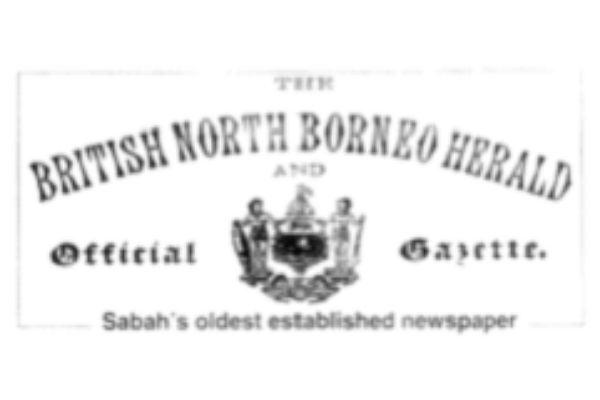

Borneo’s first newspaper
Published on: Saturday, October 03, 2020
By: British North Borneo Herald
Text Size:

THE issue of the first number of the first newspaper published in North Borneo affords a favourable opportunity for a brief review of past events in the history of the youngest government in the world; and we shall endeavour to find room in our columns, from time to time, for a short retrospect which will enable our readers to note the progress made in the development of the territory.
It was in December, 1877, that negotiations were first entered into with the Sultan of Brunei for the cession of his territory in Borneo north of the Kimanis river, in consideration of the payment to His Highness and to the Pangeran Tumonggong, his Prime Minister and heir apparent, of an annual subsidy, and in January of the following year a similar understanding was arrived at with the late Sultan of Sulu, the father of the present Sovereign, whose authority was recognised over the North-east part of Borneo.
The country ceded by the agreements thus entered into comprises the whole northern portion of the island of Borneo, from the Kimanis river, a few miles north of the British colony of Labuan, on the West Coast, to the Siboku river, the Dutch boundary on the East Coast, with an area estimated at above 20,000 square miles, and a coast line of over five hundred miles.
In reporting the matter to the Foreign Office, Mr Treacher, then H.B.M.’ s Consul-General in Borneo, stated “The new Lessees thus become possessed of all the best harbours in northern Borneo, and those which may be said to command the route to China, vessels in the north-east monsoon passing at no great distance from North Borneo.
Not only does this portion of North Borneo contain the best harbours, but it also possesses the best soil and is richest in natural productions, such as edible bird’s nests (in which the river Kinabatangan is especially rich), camphor, rattans, sago, gutta-percha, &c., and there is little doubt that when explored it will be found to contain valuable minerals. The existence of coal is already known.”
The sanction of the Queen to her subjects exercising sovereign rights and organising a government on civilised lines in a distant country, where no system worthy of the name of government had ever yet existed, had still to be obtained; but meanwhile no time was lost: the old flag of the Dents’ was hoisted as the ensign of the new government, in compliment to the gentleman whose energy and resources had rendered possible in the present day the inauguration of an enterprise similar to, and which we hope will prove a worthy successor of the Company which founded the British Empire in India, a Resident was appointed at Sandakan on the East Coast with a few coolies to represent the majesty of the law, and another at the Tampassuk river on the West.
The Lessees then sailed away for England, and their efforts to procure the recognition of their infant government, and the confirmation by Her Majesty of the powers conceded to them by the two Sultans – efforts, the history of which is fully told in the two Blue Books of 1882 – were at last successful, and the British North Borneo Company was inaugurated by Royal Charter, under the Great Seal, dated 1st November, 1881.
Mr Pryer and Mr William Pretyman were the two Residents originally appointed, the latter gentleman being soon succeeded by Mr A.H. Everett from the Sarawak service, who took up his headquarters on the Papar river.
Their’s was the difficult task of upholding the dignity and good name of the white man, and of preparing the way for the establishment of civilised government, of checking and controlling oppressive acts of native chiefs, of settling disputes and of opening the country to peaceful traders.
And right well they performed their task, during nearly four years, with no regular armed force at their backs, and with more than ordinary difficulties to encounter, owing to the reports which obtained currency among the natives – that the long delay in obtaining the Charter was due to the fact that no Charter would be given and that the white man’s stay amongst them would be but brief.
ADVERTISEMENT






